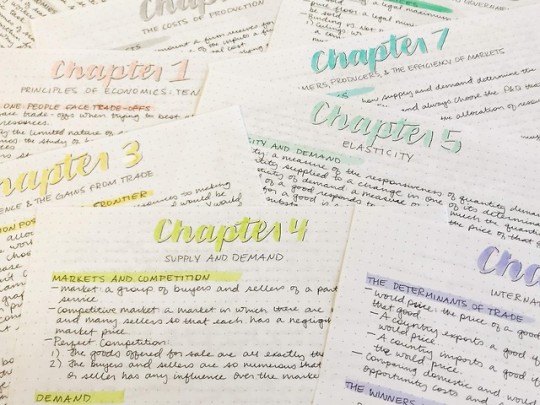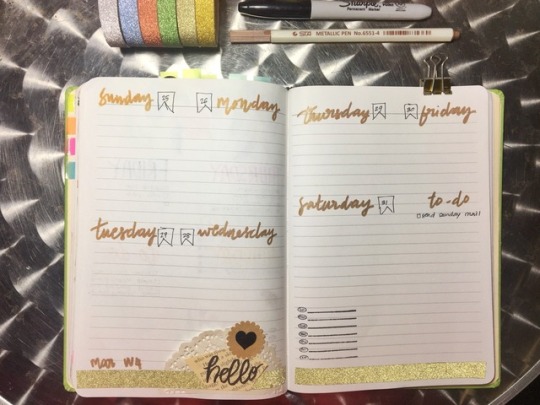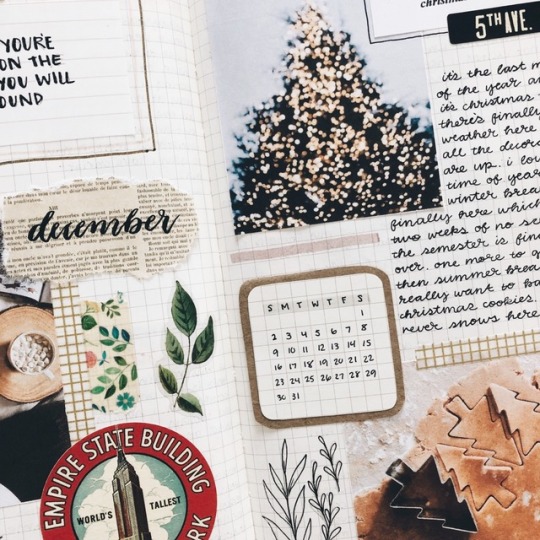Text

Listen to music in that language. Listening to music in the language you are trying to learn surrounds you in the language and helps you develop a sense of how it sounds.
Watch TV and movies in that language. Listening to people have actual conversations in the language can help give you an idea of how it works. I recommend watching variety shows and children shows because the language is normally very basic. Plus, variety shows normally have certain words and phrases on the screen.
Use flash cards and take quizzes frequently. This helps you stay sharp with things you really need to know and remember. I personally don’t like flash cards, but when it comes to learning vocabulary, it can be a big help.
Practice writing and spelling. You can do this by writing daily in a journal. This can also help with forming your own sentences. Simply write about things like what you ate or what you did, or your thoughts in general. The more you write, the more comfortable you will be forming your own sentences.
Try speaking in the language whenever you get a chance. Do it with a friend who’s also learning or someone who already speaks the language. If you can’t do either one of those, you can practice by talking to yourself or an assistant on your phone. There are also apps such as hellotalk or kakao where you can talk to people. ALWAYS BE CAREFUL WHEN TALKING TO STRANGERS!!!
Learn words and phrases that you find yourself using often. Don’t try to learn advanced phrases and terms that you don’t use on an everyday basis. You may think it’s helping you, but it’s actually setting you back.
Learn more about the culture that surrounds the language. When you learn more about the culture, you will understand why certain things are said in certain situations. Understanding the culture = Understanding the language
Master the alphabet + pronunciation. Before you learn any sort of vocabulary or sentence forms, fully understanding the alphabet and each letter’s pronunciation is a MUST! In every language, there are those letters’ sounds that change depending on certain factors.
Master sentence structure. Sentence structure is a big problem that many people face when first learning a language. Chances are the sentence structure of the language you’re learning is the complete opposite from your own. (Unless you speak English and are learning Chinese; vice versa)
Become familiar with the keyboard. You will probably find yourself typing in the language often, so you might as well learn the keyboard. I recommend downloading a keyboard on your phone from the play store or app store.
Practice daily. When you do this, you’re bound to remember the information better. If you don’t and you stop studying for too long, there’s a high chance that you’ll forget some of the basics. I would know. It’s happened to me before.

GOOD LUCK
5K notes
·
View notes
Text
When is Scots Gaelic gonna appear on duolingo
347 notes
·
View notes
Text

Almost forgot to upload this. This it’s the end of the semester I’m not sure what to write notes about 😭 I do have a PTCB Test to take in January, so hopefully I actually get my butt to work on those notes soon.
79 notes
·
View notes
Photo
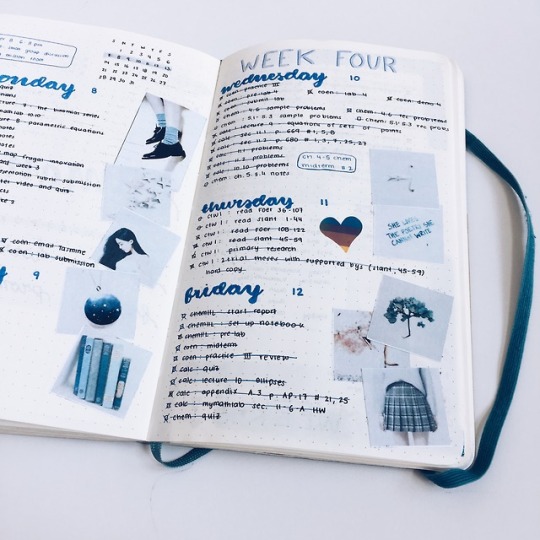
another side of week 4, this is one of my favorite spreads that i’ve done since uni started
900 notes
·
View notes
Text
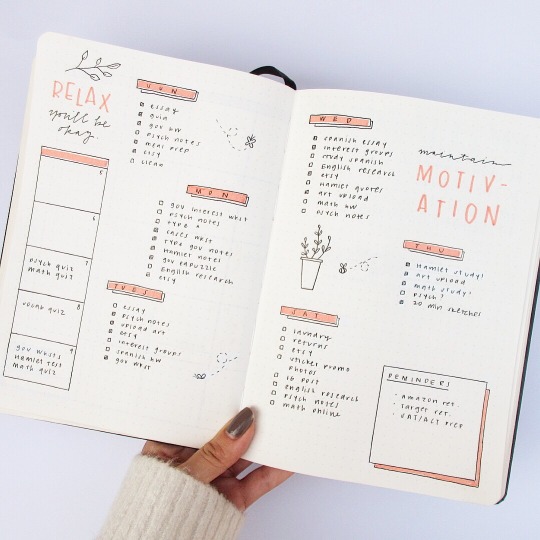

12.10.18. An old spread from my planner. Between school, college applications, my relationship/friendships, and every other commitment, life has been a little overwhelming lately. I find that writing reminders to myself in my planner helps to calm me down :)
2K notes
·
View notes
Text

the softest saturdays <3
(my insta: @milkybujo)
4K notes
·
View notes
Photo


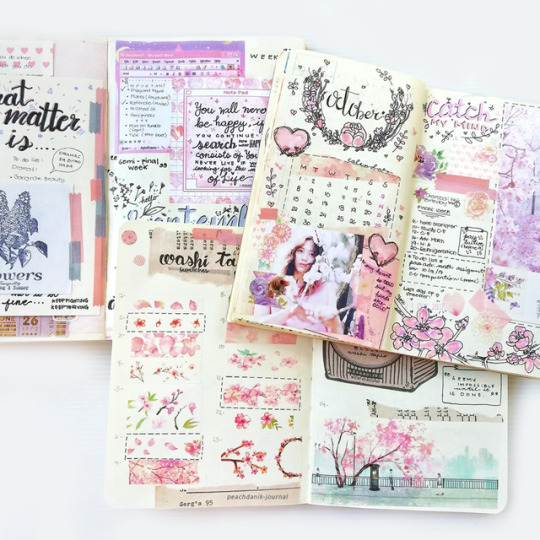
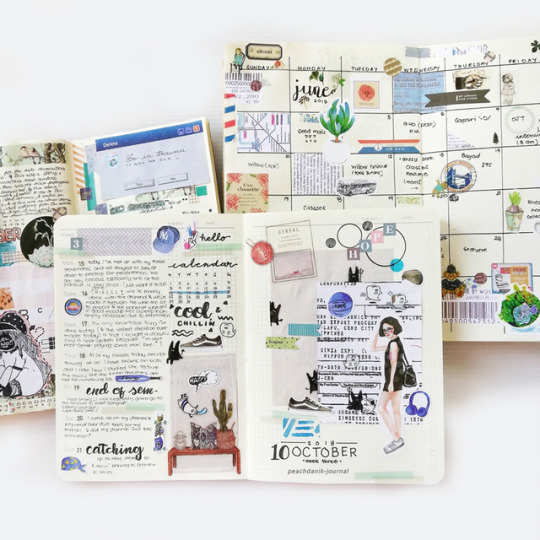
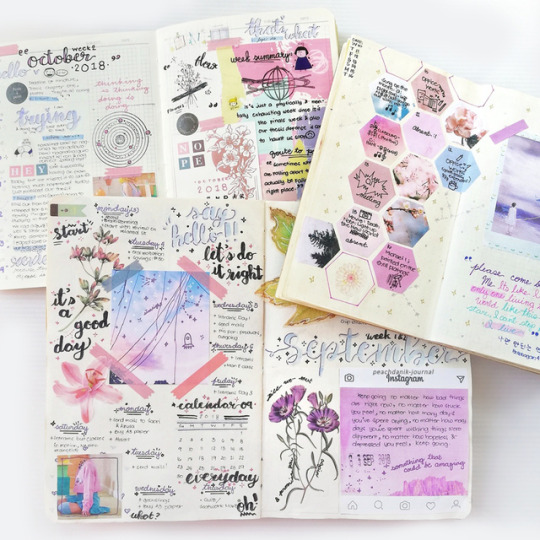
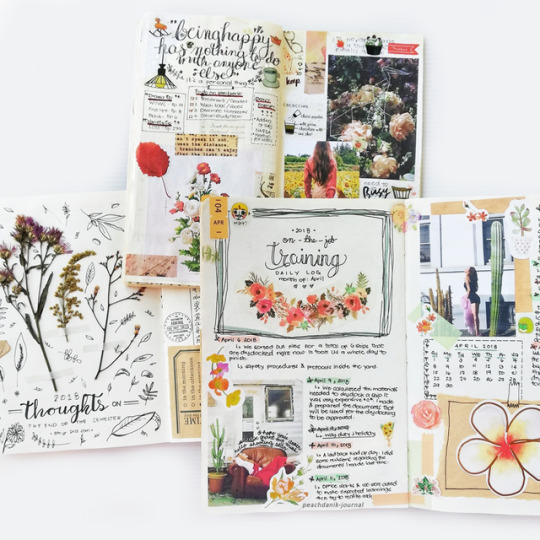
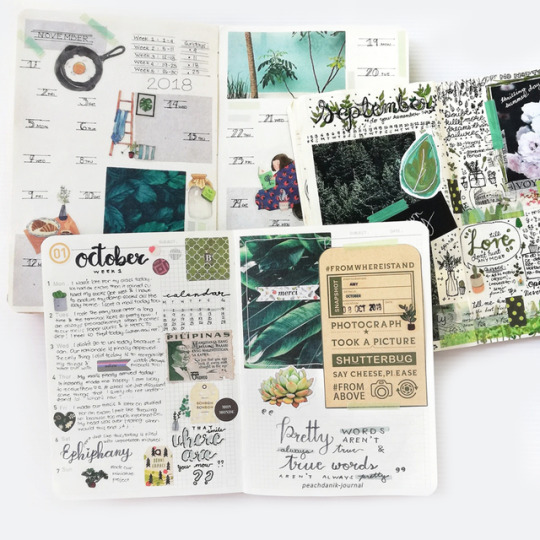

Compilation of all my journals.
instagram: applefroyo
8K notes
·
View notes
Text
How I study for finals
The most important step, PLAN PLAN AND PLAN!
This includes both a bigger plan for how you’re gonna cover the syllabus and a smaller day to day plan, for example if I have one month’s worth of classes in a final, I’ll usually do 5-7 day’s worth in one day. And I start out by the things I know very least. What I find most useful is downloading a calendar and filling it in this is an example of my brutal internal medicine schedule

As you can see, I don’t go by the order of the class schedule, instead I divide topics depending on what I already know most about and plan accordingly, taking both order and workload into consideration (obviously the things in lilac above would take a fraction of time compared to the things in yellow for example) and when it comes to reviewing, I go through the yellow stuff first. A crucial thing I do is that I leave at least 2-3 days empty because we all know schedules don’t always go as planned. And obviously this isn’t my entire IM syllabus, I already finished cardiopulmonology and other branches so I didn’t include them.
As for the actual day plan, I find that studying for the entire day can be extremely tough for me and wears me out like crazy, I only do one study session in the morning, spend 3-5 hours hanging out with people or playing sims, whatever I want basically, do practice questions for 2 more hours (relevant to that study session of course) and chill out for the rest of the night.

Moral of the story, pulling an all day study session/cramming=early burn out. You don’t want that so literally plan every part of your day, this is a crucial time.
I always say this but it’s so important, passive reading is NOT ENOUGH DO SOME PRACTICE TESTS/MCQs or whatever you can. Like I said, I do practice questions for things I’ve went over every single night during finals and that honestly imo is waaaay more important than just reading the stuff over and over. An important thing to mention here is to NOT GET DISCOURAGED when you get stuff wrong, that’s actually something you learned and you won’t make that same mistake again so .. it’s all good, you’re making progress.
That’s the main part of how I actually study, below are some of my tips that I stick to by heart.
Use the same source you learned from during the year this is crucial for your memory, do not *spontaneously* decide to use a different textbook or source just before your finals, whatever you studied from HAS TO BE what you revise from.
All nighters won’t do you any good Obviously your brain needs to sleep in order to consolidate information so just make sure you get enough sleep, some people study better at night and they get plenty of sleep during the day, not the ideal situation for your circadian rhythm or hormones but if it works for you, do it (it’s finals, we’re all practically dead anyways) .. yeah just make sure you get some sleep in. And trust me when I say no matter how much you think you can cram and get in during those hours you’ll be sleeping, sleep is so much more important than that, I know it’s tempting but GO TO BED.
Now is not the ideal time to eat absolute garbage food because you’ll feel like shit and (if you’re anything like me) won’t get anything done …so just eat the best way you can and I’m not gonna be one of those people who tell you to work out because I can’t bring myself to do it during finals, it’s just too much for my lazy ass .. but I do stretch every now and then and my “breaks” usually consist of me going on a walk or something. So just do little things that can make you feel good but don’t freak out if you can’t exercise or get 2 hours in at the gym, just keep a healthy balance. I have no idea if there’s any scientific background to this but I (think) honestly believe that almonds help with my memory?
Know that it’s honestly okay to stop when you’ve had enough and that everything eventually ends and that a bunch of numbers (your grade) DOES NOT DEFINE YOU. So what if you lose a few marks? So what if you don’t get this and this right? Even if you fail, what the fuck is wrong with that? You’ll learn from your mistakes and do better. The fact that you’re trying to better yourself and trying to learn new study techniques is enough, you should be proud of yourself regardless of the outcome.
3K notes
·
View notes
Text
once you stop fantasizing about that ideal version of yourself and start working towards becoming that person by setting your alarm clock earlier and actually going to the gym and actually volunteering at places and actually eating healthier and not procrastinating and working just a little bit harder you’ll realize that it was so easy all along. becoming your ideal self will only ever exist in your mind until you make the decision to work towards becoming that person. get up!! get going!! it’s now or never!! there is no light at the end of the tunnel!! get that flashlight and pave your own path bitch bc no one else is going to do it for u!!
259K notes
·
View notes
Photo

if you are looking for some good habits to implement into your morning routine, consider drawing a few from this list :)
1. Drink a glass of water as soon as you wake up.
Why? This will help your body get rid of toxins, improve your metabolism, increase your level of alertness, help you rehydrate, and more.
How? Keep a glass of water next to your bed and make it a habit to fill it up before you go to sleep. Or, simply make it a habit to drink water when you get down to your kitchen.
2. Get out of bed immediately after waking.
Why? Hitting snooze multiple times leaves you more tired than you were when you first woke up because of the incomplete sleep cycles you just made your body suffer through. Also, getting up instead of scrolling on your phone will help your brain reinforce that the bed is for sleeping only, thus making going to sleep at night easier.
How? Set your alarm across the room so you have to get up to turn it off. If the cold makes you want to get back into bed, keep a throw on top of your bed that you can wrap around you.
3. Make your bed.
Why? I used to not make my bed (I am a messy person by nature) because I would just think that the bed would get messed up that night anyway. But making my bed now makes me feel good, because I’m already accomplishing something early in the day. It sets my day off to a productive start. Also, it looks nice, and I like getting into a folded bed at the end of the day.
How? Just do it as soon as you get out of bed. Also, once you fold your bed, you’re less likely to get back in it.
4. Don’t use electronics until you are at work/school.
Why? It’s hard to find times to disconnect from the world and have a little me-time. I think it’s important to allot time for introspection and self-reflection.
How? Turn your phone on Airplane mode before you go to sleep and then only use it to wake up. Better yet, buy an actual alarm clock and turn your phone off at night.
5. Eat a healthy breakfast.
Why? Eating breakfast energizes you, reduces your cravings later in the day, increases your concentration, and more. Start your day off right!
How? You can prepare your breakfast the night before or include it in your meal prep for the week. Or, if you want to make your breakfast in the morning, you can make it an enjoyable experience by listening to music, a podcast, or an audiobook.
6. Remind yourself of what you’re looking forward to.
Why? Mornings can suck if you aren’t a morning person. Revving yourself up for the day can make getting up feel worth it.
How? Make a list of things you are looking forward to the night before so you can look at it in the morning.
7. Stop drinking coffee.
Why? Dependence on coffee sucks, especially when you try to get off it. Also, dependence decreases caffeine’s effectiveness. There are plenty of other options.
How? Try tea, green smoothies, or simply a glass of water with lemon. Or, you can try for better sleep habits.
3K notes
·
View notes
Photo
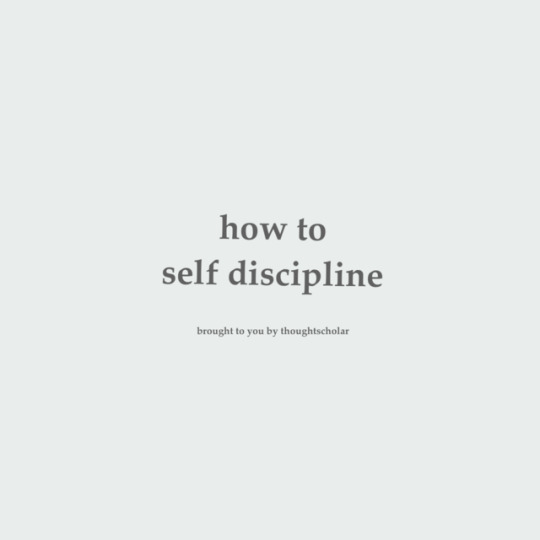
● seize time opportunities. If I have 15 minutes until your next class, I sit down and do homework in the hallway. If I have a long commute, I’ll do flashcards. This works because you most likely won’t have anything else to do anyways, so it’s easier to get your work done.
● start something. When I get a lab report assignment, the first thing I do is pull up the directions and at least start the cover page and pull up some research links. It takes 5 minutes but it gets the ball rolling and makes it more likely that you’ll finish what you started.
● auto-mode. When I procrastinating, it’s usually because I’m too busy thinking about what I’m going to do. Instead, I like to pretend I’m in “auto-mode” and just get started as fast as I can. auto-mode means shutting out distracting thoughts or pleas to watch one more funny cat video and forcing your hands to open your textbook. Works every time.
● personally, creating time schedules don’t work for me because if I fall out of time, the whole schedule falls apart and I usually give up. Instead I use time games. I’ll tell myself something like “work as hard as you can until 11:00 sharp and if you finish, you can have a break”. This is great for developing self discipline because it’s in the moment so you can be more realistic and flexible.
● i don’t like writing down earlier due dates in my planner because it’s confusing so instead, it’s good to have some sort of mental rule. for example, my mental rule is to finish everything at least two days before the due date. following through with that will keep you on track.
● do a little bit every day. If you have a big project, chip at it within a week rather than stressing out 2 days before it’s due. the same goes for studying for an exam. if you review lecture notes and attend office hours after class + work on flashcards throughout the week, then do a final review at the end, you’ll be well prepared and won’t need to cram. It’s a good habit and you won’t get stressed. Two birds with one stone.
● use mornings too. I’m not really an early bird, but using mornings to get some work / chores done is great because it gives you a productive start to the day, which makes you feel proud of yourself for knocking out half of your tasks in the a.m.
a. Lay out your lecture notes / worksheets on the table the night before and open your work tabs on your computer so they’ll be the first thing you see when you turn on your computer.
b. Put your computer far away from your work space and go to sleep.
c. When you wake up, the first thing that you’ll see is your ‘paper’ work, so get it done first. then start on your ‘screen’ work (you’ll be less likely to get distracted if you do your ‘paper’ work first). when you open your laptop the first thing you’ll see are the work tabs you opened the night before. Your job is to go on auto-mode and get started.
Good luck with self-discipline. You’ll do great. - hana from thoughtscholar
14K notes
·
View notes
Text
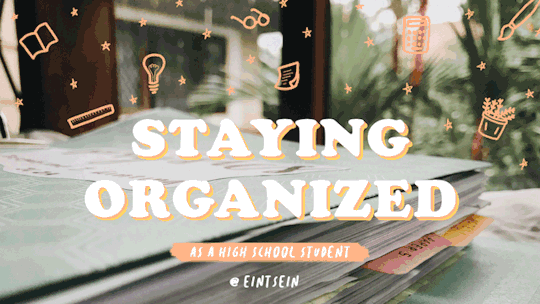
Hey guys, so I’m nearing the end of my senior year, and it’s been great so far! I accomplished my academic tasks efficiently and didn’t burn myself out, and I think the main contributor to my success as a student is my organization system. This system has been refined throughout my high school years, but I think now I’ve finally found the most effective methods.
Please remember that this isn’t the only organization system you can adopt; this is just the one that works the best for me, and I hope that by sharing it with you, you’ll gain a new perspective on how to stay organized as a high school student.

The first thing I wanna talk about is my notebook system, which I briefly mentioned in my Guide to Note-Taking.
My notebook system comprises three types of notebooks: the Everything Notebook, the subject notebook, and the revision notebook.
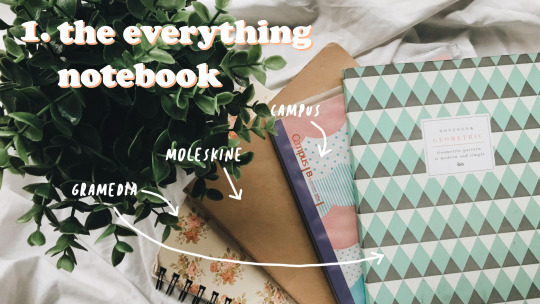
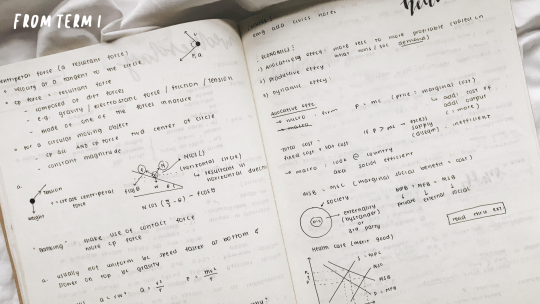
The Everything Notebook
The first stage is in-class notes. I only bring one notebook to school every day. I call it my Everything Notebook, and this is where I write down all of the notes I take in class. This way, I don’t have to lug around six notebooks where I’m only going to use a few pages in each of them that day.
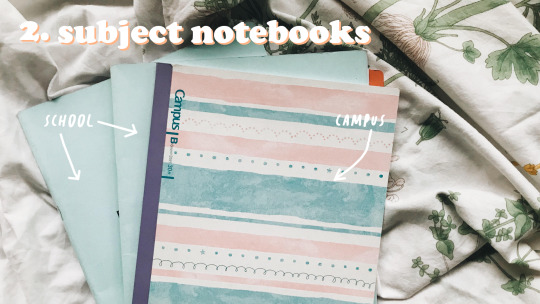
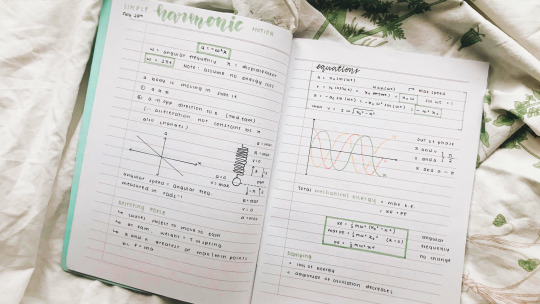
Subject Notebooks
At the end of the day, I would revise my notes and compare them to the syllabus so I know where we are in the learning process. I would then transfer my class notes from my Everything Notebook to my different subject notebooks. This is stage two. I also start to jazz up my notes because I use the notes in my subject notebooks to study for tests.
In addition to my class notes, I include material from my teachers’ notes that they might not have elaborated on, as well as points in the syllabus (I’m currently taking A2) that were only glazed over briefly, or not at all, in some cases. (Note: this does not mean they completely skip a chapter or topic; it’s more like they missed a few bullet points that should be in my notes but aren’t. An example would be if we’re learning about phenol reactions and the teacher forgot to mention the use of FeCl3 as a test for phenol.)
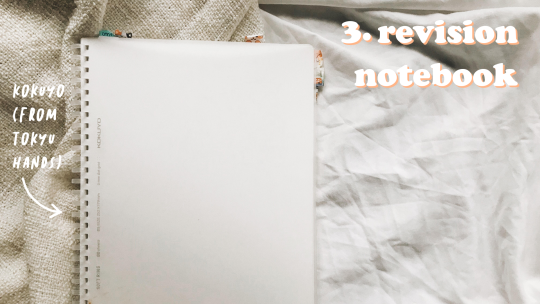
Revision Notebooks
Stage three comes a little later, when exam week is just around the corner. Essentially, I rewrite and improve my notes from my five different subject notebooks into a single revision notebook or binder. (Recently, I’ve opted for a revision notebook because they’re lighter and easier to carry around.)

Because my teachers don’t always teach in the order of the syllabus, the first thing I do is organize my notes according to the syllabus. I would then fill in any other missing gaps in the material that hadn’t been filled in stage two.
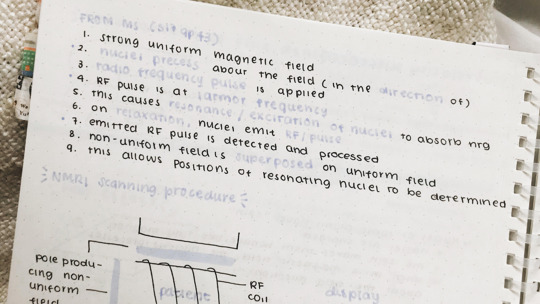
When compiling material for my revision notebook, I use as many sources as possible: my own notes, my teachers’ notes, youtube videos, online sites, and my favorite, the mark scheme! I add in some answers from past papers (explanations only, so no calculations) mainly to secure marks. It’s safer to memorize definitions straight from the mark scheme than from the textbook or from handouts. I also do this to ease my memorization, especially for topics that require lengthy explanations. It’s a lot easier to remember the 6 points I need to explain the principles of NMRI than to remember everything in the four-page handout my teacher gave me.

Folders and binders are essential to organizing your papers. Some people keep a single accordion folder for all their papers, but for me it’s just too heavy to carry around all the time. The same goes for subject folders that are brought to school every day.
Instead, my binder/folder system comprises my Everything Folder and my subject binders.
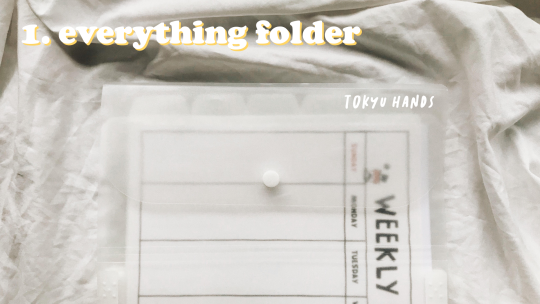
The Everything Folder
The folder I carry with me to school every day is this A4 folder I got from Tokyu Hands. It has 5 pockets, one for each day of the week, so all the papers I receive on Monday will go behind the first divider, and so on.
Some people also keep blank papers in their folders; I don’t because my school has its own lined paper and graphing pads that I keep under my desk that I use if a teacher asks us to do an assignment on those papers. If I do work at home, I prefer to just use a plain A4 paper or a legal pad.

Subject Binders
At the end of the week, I’ll sort my papers into my subject binders. Sometimes I’ll keep some papers in the folder if I think I’ll be needing it the next week. This usually only applies to worksheets because all my teachers’ notes are available on Google Classroom, so I can access them even if I don’t physically have them.
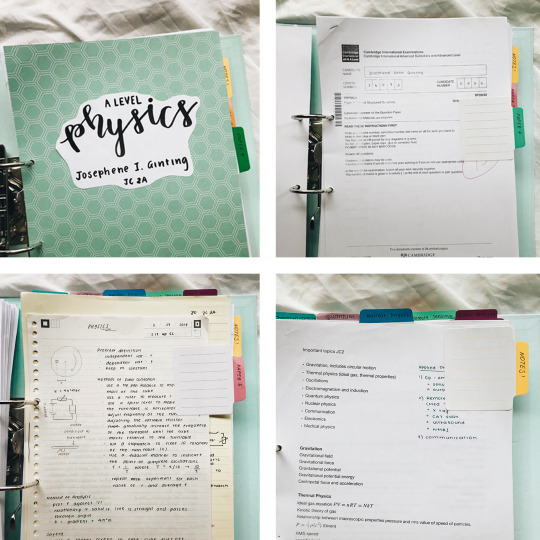
Each of these binders have sections inside them:
Physics: 1 for handouts, notes, and tests, 1 for Paper 4 (Theory), 1 for Paper 5 (Practical Planning). I included extra tabs to mark the different topics in the handouts section.
Chemistry: same as Physics.
Economics: 1 for Paper 3 (MCQ), 1 for Paper 4 (Case Study and Essay). A lot of my Economics material is online, though.
English: 1 for Paper 3 (Text and Discourse analysis), and 2 for Paper 4 (Language Topics, which includes 1 for Child Language Acquisition, 1 for World Englishes). Past papers, handouts, and notes all go under their respective topics.
Mathematics: I just keep everything together because I never revise math and just constantly do past papers.
This makes it easier for me to revise each subject because I can just take one binder with me instead of a messy folder with everything just shoved in there.

I keep a magazine file for each of my A-Level subjects (English and Mathematics are combined). All my textbooks, revision guides, and subject notebooks are kept here, so if I need to revise one subject, that’s the magazine file I’ll take out.
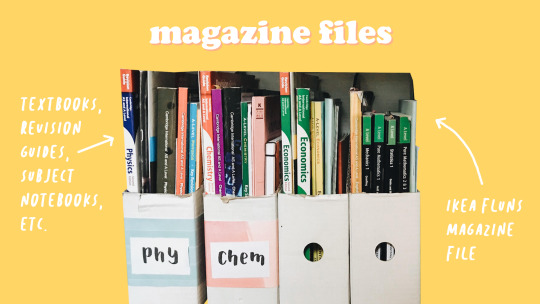
These magazine files prevent any small things (like my book of flashcards) from being shoved to the back of my bookshelf, or materials from different subjects from getting mixed up.

In my senior year, I mostly plan using this app called Edo Agenda. It syncs across all my devices for free and has all the features I need: a to do list to organize tasks, monthly and weekly calendars to organize events, a journal to organize notes and memos.

I used to bullet journal regularly, but it takes too much time during weekdays, so now I just bullet journal for the therapeutic effects it gives me, and I use an app for organizing tasks and events. Sometimes at the end of each week, I’ll transfer my tasks to my bullet journal and then decorate the page, but again, this is just for its therapy.

Organizing your school supplies is just as important as organizing your papers and notes. With a more organized backpack and pencil case, you won’t waste time looking for your things at the bottom of an abyss.
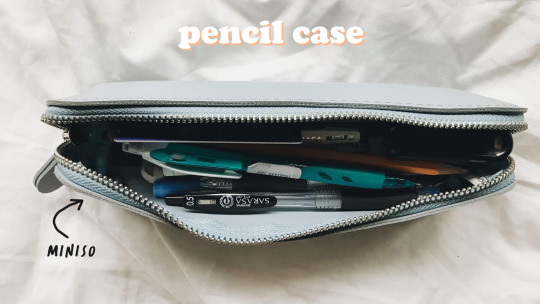
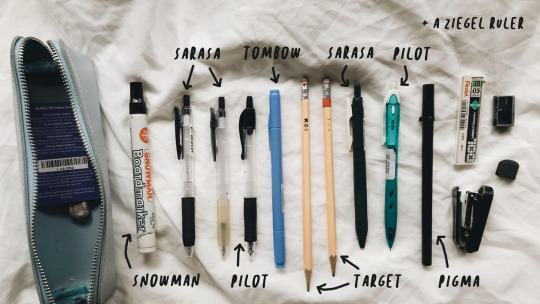
Pencil Case
I don’t find it necessary to bring so much stationery to school unless I plan on making notes at school (usually during revision week).
Backpack
Because we’re already in the revision term, I don’t really carry a lot of things in my everyday backpack, just the following:
Pencil case
Everything Notebook
Everything Folder
Revision notebook
Kindle
Phone
Wallet
Earphones
Calculator
Speaker
Drinking bottle
A pouch with things like a hairbrush, pads, and lip balm
And that’s all for now! I hope this post will help you organize your school life (if you haven’t already) or at least provide some useful insights on some ways to stay organized as a high school student.
45K notes
·
View notes
Photo
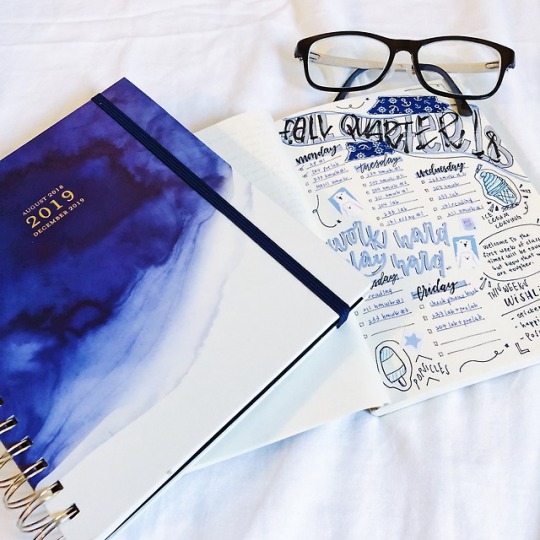

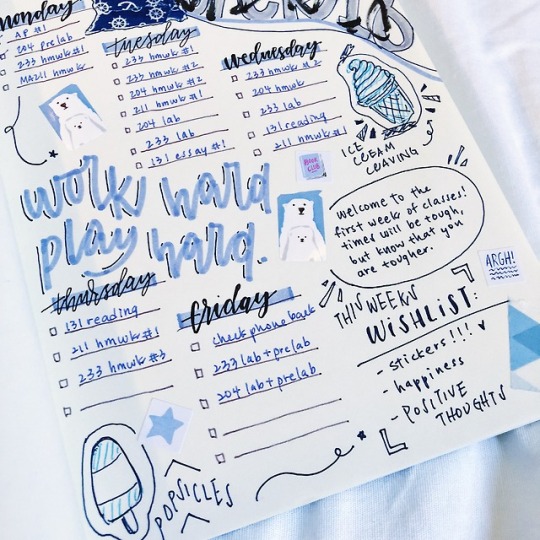
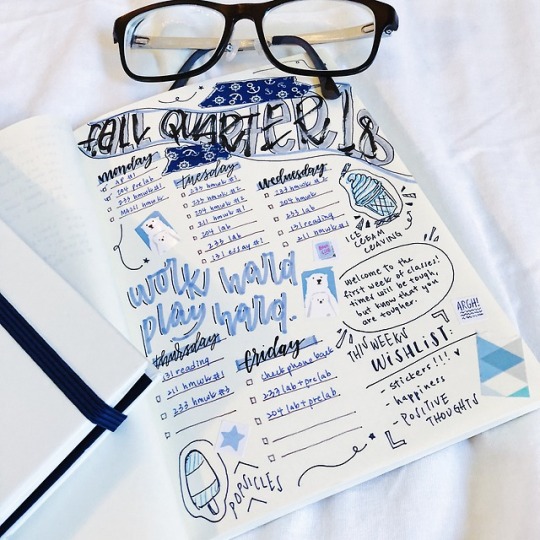
september 4th, 2018
“lately, i’ve been, i’ve been thinking / i want you to be happier, i want you to be happier.”
2K notes
·
View notes
